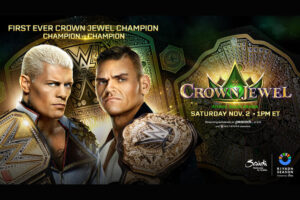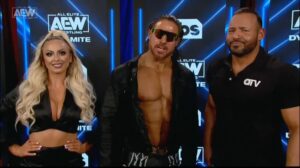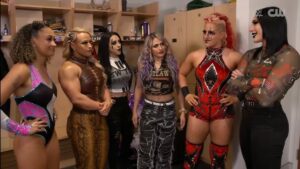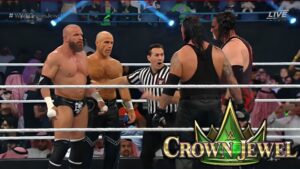In this first of three articles, James unpacks how since Wrestlemania XL changes in the relationship between WWE and its founder Vince McMahon have impacted perceptions of the new era of wrestling. Since Vince put his remaining TKO Group Holdings stocks up for sale, the company is almost disconnected professionally from the man who made WWE a global cultural brand. This has impacted AEW and WWE both in terms of creative, business and its fanbase’s perceptions.
In the next two articles, James will analyse first how The Paul Levesque Era has fulfilled WWE fans’ wishes. In the last, how differently AEW faces differences in its fan’s expectations.
“Damn, I Love Pro Wrestling”
For some fans, that expression of explicit joy from Michael Cole for pro wrestling signalled that the era of Vince McMahon was over for good. Unlike Wrestlemania 39, it’s not a false dawn. Now, Michael Cole and other commentators have used what were once forbidden words, like pro wrestling, repeatedly.
Yet at Mania, it was the match to light the fireworks. The added confirmation that WWE is “back”. A perceived correction was made. Vince’s presence, despite claims of staying “out of the weeds”, lingered after Cody Rhodes failed to complete the story on the first try.
The bookending of Mania made it clear: this is “The Paul Levesque Era”.
Symbolically, change was there in plain sight. Beyond Triple H’s declaring it, the message seemed drummed in and repeated throughout the night. Even in small choices. Like the national anthem replacing America the Beautiful. For a wrestler whom many fans for years hated for burying people, many are happy with his burial of his father-in-law’s legacy. Out with the old and in with the new.
Ding dong, the Vince is (metaphorically) dead! The signs are that WWE is trying to erase Vince from its history, like it has before with its problematic performers of the past. At least for the time being. Yet, just like in those incidences, just because they are out of sight, doesn’t remove them out of mind.
Although, to a certain degree, I would argue that some fans are happy to go along with erasing McMahonism. The issue is this runs the risk of also misappropriating credit to Triple H when in fact WWE’s current success and upward trajectory are rooted in Vince’s decisions.
Even the change of language used to describe WWE is essentially McMahonesque. The change to WWE’s USP (its unique selling point) from “sports entertainment” to…
“Sports and entertainment”
The addition of “and” is key for two significant reasons. First, it’s a supposedly clear break for the new Paul Levesque Era from the trappings of Vince. It’s a break away from the old, self-denying term that tried to pretend the second W did not stand for wrestling. And yet it retains familiarity with the past. It’s having their cake and eating it too.
Second, it helps display the regime’s narrative. WWE is more than a pro wrestling company. No more denial or word games. It’s the implication WWE is now more sports-driven while retaining the entertainment factor. The blending of new cinematic elements of production and storytelling with clear logical and storyline-orientated action.
It also implies WWE is more than pro wrestling. It’s a slight but significant change. One that initially, when announced, concerned me as a fan of having a competitive wrestling market.
However, if like me you enjoy studying the connotations and implicit meaning behind language, you may have already come to the same conclusion I have. A conclusion is that the more things change, the more they stay the same.
We’re Number One
The Paul Levesque Era in essence and approach is still, like Vince McMahon, to monopolize wrestling. Voices of Wrestling dissected how WWE’s RP team systemically control the mainstream media narrative that favours them and disparages AEW. WWE is hot. They are right, in business terms, taking advantage.
The by-product of this cultural narrative is that while WWE is in a financial and creative “Renaissance”, AEW is therefore “dying”. The Monday Night Wars narrative is such an easy comparison that is being made. Ironically, The Elite in AEW is also trying to have its cake and eat it too, but to try and address this narrative.
In approach, Triple H is approaching opposition to market dominance in the same way as his father-in-law. But part of the presentation is interesting in that Paul Levesque is the person to receive the lion’s share of credit without mentioning the foundations Vince provided. Arguably, the reason WWE is in this position, at least financially is happenstance rather than due to Triple H or creative.
Although the latter has helped immensely, CM Punk in 2011 was right in WWE and Vince could make money “despite himself”.
Age of Myth-Making
The thing with perception is it becomes reality. George Orwell, the writer of 1984, would have loved wrestling because of how companies, pundits and fans use and twist language to build their narratives and myths.
Tribalism and echo chambers, which are not a new phenomenon, but only more technologically sophisticated and widespread in our society due to the internet, make facts flexible and subjective. Opinions are concrete and true. This is a wider symptom of our Western political divisions. It has resulted in and will result in lots of false narratives being created.
Elsewhere, I’ve covered myths around AEW contracts and wrestlers’ pay. The things both WWE and some of its fans have missed about why some wrestlers prefer AEW (spoiler: it’s not just to do with the grind). Even why discussion around whose better, The Undertaker or Sting(?), is built on either recency bias or modern discord.
These narratives play a purpose for both the company and the customer. They help us to identify and feel connected with our media. From the company’s standpoint, they want fans to focus on the positives. Their narrative. At present it puts Paul Levesque front and centre. From a creative standpoint and as a locker room leader, yes, he deserves credit.
However, from a business standpoint, something that fans online are quick to tout about WWE, the success comes because of Vince. Two men Vince hired, before the series of scandals broke, have helped more than Triple H in making his era what it is today.
PR Spin
The successes are touted and repeated by the media. WWE Senior Vice President of Communications, Chris Legentil, is the person behind the scenes generating the spin. Legentil’s management of the press and media has allowed the deluge of positive reporting to distract from more negative aspects of WWE’s legal issues beyond Vince.
For instance, settling with Court Baur’s MLW anti-trust lawsuit and settling with former writer Britney Abraham’s racial discrimination lawsuit. Currently, as reported in February, WWE is suing the state of Texas to stop Wrestlenomics from having access to documents linked to attendance numbers and ticket sales for the Royal Rumble in San Antonio that would otherwise be available on public record.
Beyond WWE, some pundits have monetized the anti-AEW hate market into a cottage industry. These figures are eager to stir the pot with AEW fans who are happy to weaponize the positives, which often causes distractions from these other issues.
To be clear, there is nothing wrong with WWE celebrating its successes. WWE fans have taken years of abuse from wider popular culture for liking wrestling. As well as from WWE itself. Fans are not morally responsible for the actions of the company. Unfortunately, these issues and moral dilemmas impact various sports. And as I’ll discuss later, there are ways mentally we side-step moral complexity.
Business is Booming, Thanks to One Man
Nick Khan has revolutionised the way WWE does business. As an outsider with experience as a talent agent and business executive, Khan brought connections, knowledge and skills working with various creative, sports and media industries WWE did not have before.
Khan has perhaps proven to be the greatest hire Vince made in his later years. In the 2010s, WWE was making huge record profits, regardless of barren creative. More so than the glorified Attitude Era.
Then Khan arrived. His approach has packaged WWE’s unique cultural value to the extent that countries and cities pay to host WWE events. This narrative is often used to diminish AEW by comparison.
Yet often the sentiment behind it gets something wrong. It’s not just because WWE is popular again. It’s because the man who oversees this section of the business has brought newer corporate dark arts to wrestling that’s allowed WWE to maximize its profitability more than ever.
Beyond the business being the machinery left by Vince, there are still McMahon’s fingerprints in the most significant aspect of WWE’s wrestling product.
Sports and Entertainment are Not Equal Partners
WWE has fulfilled the wishes that fans have been asking for over a decade. I’ll explore these more in the next article. Although it’s important to point out that while some WWE fans feel wrestling is back, pointing to attendance, money and ratings, there is another striking number. The amount of wrestling on WWE shows compared to AEW is night and day.
Last week AEW Collison’s main event between Swerve Strickland and Claudio Castagnoli went longer than all the combined matches on Smackdown that week. This past week the percentage of actual wrestling bell-to-bell on Raw was 27% over three hours and 33 28% on Smackdown.
At times, PLEs such as the Elimination Chamber in Australia are four and a half hours long. The largest gap between matches was over 50 minutes. The entire show had only an hour and 50 minutes of wrestling.
Some may argue quality over quantity or the importance of pageantry. WWE excels at the latter, but that for some doesn’t cover up that some divisions are booked better than others. See the cold reception WWE’s lower card women’s division and women’s tag team division receive.
The wrestling quality has been more consistent under Triple H. Wrestling at times returns to the forefront but shows are still open with SNL-style monologues. Cards seem to be made on the fly and authority figures and top heels still make decisions.
Solo Sikoa is presented as possibly the next Tribal Chief, despite a long losing streak. DQs and no contests still happen. There are holes in WWE’s storytelling that existed under Vince.
And yet the crowd remained hot. The deafening sound made in France last night shows fans are not only invested but this is what they want. Fans are more than satisfied and that’s all that counts.
The Eggshells Have Left the Building
Perhaps Triple H’s biggest success is the change in WWE’s working atmosphere. Behind the scenes, many wrestlers and former WWE wrestlers are keen to point out positively the way WWE feels relaxed. The Undertaker described it as “calm, almost too calm”.
Without late changes occurring almost minute to minute and a more approachable style of management, it’s undoubtedly made WWE a better place for many WWE wrestlers and employees.
Vince’s reportedly volatile nature and constant changes to programming frustrated wrestlers and fans alike. These stories normalised what would in another work environment be a hostile and unacceptable work environment. Yet because it’s pro wrestling, it’s kind of accepted by wrestlers and then fans.
Even for top stars who had access to Vince, it did not stop their mental health from being impacted like CM Punk and Jon Moxley. This has made WWE a more attractive work environment since Vince has left.
But to play devil’s advocate, is the change from the “eggshell” walking culture of WWE something to celebrate? Or in 2024 should there be a standard for every employee, whether professional athletes or ordinary crew members to be treated with respect?
Bury Vince with Cognitive Dissonance
As fans, our focus is on wrestling, but politics has played a significant role in many wrestling fans’ fandoms because of creative dissatisfaction. The fact WWE has never had a boom period this profitable makes the correlation easier to digest. Easier to justify a cognitive dissonance between the product we enjoy and the morally difficult aspects of Vince McMahon’s choices of behaviour.
Cognitive dissonance is a psychological phenomenon that impacts many of us outside of wrestling. It’s about how a person can remove a discomforting feeling or idea that conflicts with or contradicts our beliefs and values.
How we either ignore or use wrestling terminology, bury contradictory thoughts or feelings away from our morals. Almost like a self-imposed layer of kayfabe. Some folks need to enjoy something while avoiding moral conflict.
WWE and Triple H cannot remove themselves fully from Vince. Triple H is Vince’s son-in-law. As outlined, the Paul Levesque regime is not revolutionary. Rather a regime with similar philosophies that overlap closely. Triple H uses the same machinery to override the history of the other. It’s how history has always been written.
Vince cannot be wholly removed from WWE history. When writing about neurodivergence success in wrestling, I could not avoid mentioning Vince’s contribution. His impact is ingrained in every aspect of wrestling.
Morally, it can be difficult to deal with allegations when they are so deeply connected to something you care about. Wrestlers who know Vince closely are struggling with this issue. Bryan Danielson is parasocial and interpreted as a virtuous figure in wrestling. Danielson used familiar language to express his feelings towards Vince while avoiding commenting on the accusations.
“If you love somebody, is that people make mistakes and you love them regardless, you know?” Bryan Danielson, a transcript from Fightful.
It’s Human to Want to Move On
It’s easier for many to focus on the wrestling and positives and that is entirely valid.
Across sports and beyond, there are controversies that fans will turn a blind eye to. In football (soccer), fans have turned a blind eye to suggestions of corruption and breaks of human rights for workers related to World Cups in Qatar.
Then before this Russia and Brazil. In real life, consider how many fans can separate the artist. For example, separating Michael Jackson and his music from serious accusations made against him.
In wrestling, many fans like me have had to do this before. I used this self-defence mechanism myself to deal with the uncomfortable truth related to my first wrestling hero, Chris Benoit.
I live in the UK and one night, I was able to stay up to watch Raw at 1 AM. As the show started, I was greeted by the graphic used only for when people have died. I
was heartbroken and cried. Then when reality came to light, I had to deal with the fact my hero was a murderer. At first, like some folks still online, I tried to separate the work from the artist. However, I realised that this wasn’t morally acceptable to me. It was easier and better to cut Benoit out completely. Sometimes it is better to forget and move on. That’s fine.
It’s what we have the chance to do under The Paul Levesque Era. And whether the reminders of Vince bother you or not, that’s fine. Wrestling is the escape. The fact that the change has been positive just makes it easier.
More From LWOS Pro Wrestling
Header photo – WWE – Stay tuned to the Last Word on Pro Wrestling for more on this and other stories from around the world of wrestling, as they develop. You can always count on LWOPW to be on top of the major news in the wrestling world, as well as to provide you with analysis, previews, videos, interviews, and editorials on the wrestling world.






